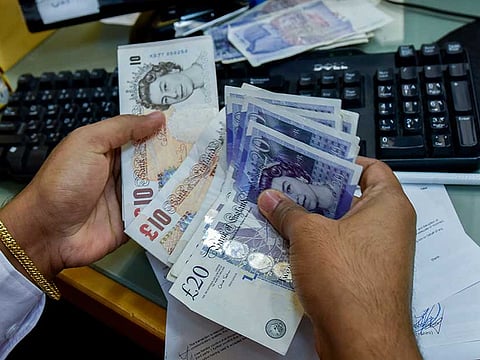Slumping pound makes everyone a currency trader as Brexit looms
In a no-deal scenario, the pound could sell off quickly

London: The pound’s weakness is turning everyone — from students to holiday-makers — into unwitting currency traders as Brexit nears.
Adam O Conghaile owed £36,000 ($46,300) to the UK government when he graduated from the University of Cambridge in 2016 and returned home to Ireland. Then Britain decided to leave the European Union and sterling tumbled, cutting the value of his debt in euros.
“I’m certainly benefiting from the weakening pound at the moment, while I’m earning and saving in euros,” said the 24-year old. “I made my first large payment of a few thousand pounds immediately after the Brexit vote, followed by another in the summer of 2017.” He’s planning a third before Britain exits.
Sterling touched a nine-month low in recent days on growing concern over the prospect of a cliff-edge Brexit. International Trade Secretary Liam Fox stoked those fears when he put the risk of leaving the EU without an accord as high as 60 per cent. Some dismissed his remarks as negotiating bluster, but even Bank of England Governor Mark Carney said the chances of a no-deal Brexit are “uncomfortably high.” And Prime Minister Theresa May said Wednesday she was stepping up preparations for such a departure.
What has been a blessing for O Conghaile has been a costly aggravation for those in Britain looking to travel to the continent, or pay off debts abroad. Chelsea Bosenberg, an Australian who’s lived in London for four years, says repaying her mortgage in Perth has become more expensive since the Brexit referendum. The 42-year-old converts pounds into Australian dollars each month, and estimates she’s getting 10 per cent to 15 per cent less than before the vote.
Birmingham resident Patrick Wernham, who plans to vacation in Lisbon next month, said he’ll buy his euros sooner rather than later. “With Brexit negotiations going the way they are, I can’t imagine the pound getting any stronger,” he said.
October and November will be a crucial period, as investors, business executives and consumers alike wait to see whether the UK and EU can reach an accord. In a no-deal scenario, the pound could sell off quickly, said Stuart Bennett, head of G10-foreign-exchange strategy at Banco Santander SA in London. “The consensus seems to be that there will be a deal, which would make no deal more of a shock.”
For Zadee Garrigue, a UK citizen, regular trips to France to see her family would become even costlier. “I try to look in advance to get the best exchange rates but it just seems to be getting worse and worse,” said the 20-year-old architecture student. “It’s definitely worrying.”
The pound’s weakness is also complicating life for Britons with European clients. Jack Benda lives in London, where he founded a public relations business, Nostra Comms, earlier this year. While a weaker pound could make his services cheaper for European clients, the volatility has made international companies more wary of the UK and increased the costs of business travel on the continent, he said.
“It’s hard to project the future of my business, both in the long and short terms, when there is so much uncertainty regarding currency,” Benda said.
Even for O Conghaile, the pound’s decline may turn into a two-edged sword. When he returns to Cambridge to pursue a doctorate this October, his scholarship will be worth less in euros — which could mean fewer trips home, he said.
For now, the main beneficiaries are those who want to travel to Britain. “We will make a new high in euro-sterling at some point,” said Kit Juckes, a strategist at Societe Generale SA in London, in an interview with Bloomberg Television. “We will have tourists all over this town.”


